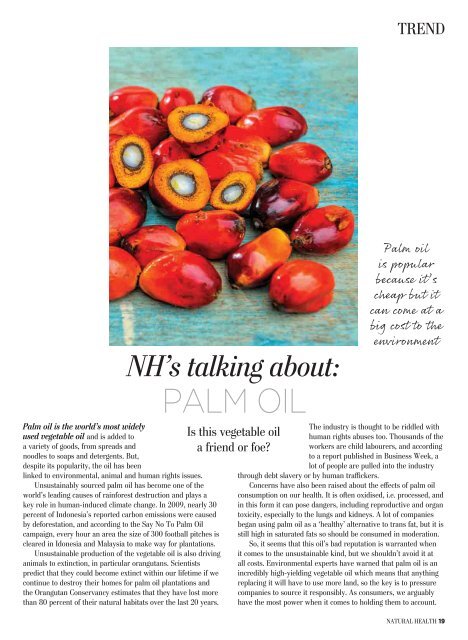Create successful ePaper yourself
Turn your PDF publications into a flip-book with our unique Google optimized e-Paper software.
TREND<br />
Palm oil<br />
is popular<br />
because it’s<br />
cheap but it<br />
can come at a<br />
big cost to the<br />
environment<br />
Palm oil is the world’s most widely<br />
used vegetable oil and is added to<br />
a variety of goods, from spreads and<br />
noodles to soaps and detergents. But,<br />
despite its popularity, the oil has been<br />
linked to environmental, animal and human rights issues.<br />
Unsustainably sourced palm oil has become one of the<br />
world’s leading causes of rainforest destruction and plays a<br />
key role in human-induced climate change. In 2009, nearly 30<br />
percent of Indonesia’s reported carbon emissions were caused<br />
by deforestation, and according to the Say No To Palm Oil<br />
campaign, every hour an area the size of 300 football pitches is<br />
cleared in Idonesia and Malaysia to make way for plantations.<br />
Unsustainable production of the vegetable oil is also driving<br />
animals to extinction, in particular orangutans. Scientists<br />
predict that they could become extinct within our lifetime if we<br />
continue to destroy their homes for palm oil plantations and<br />
the Orangutan Conservancy estimates that they have lost more<br />
than 80 percent of their natural habitats over the last 20 years.<br />
NH’s talking about:<br />
PALM OIL<br />
Is this vegetable oil<br />
a friend or foe?<br />
The industry is thought to be riddled with<br />
human rights abuses too. Thousands of the<br />
workers are child labourers, and according<br />
to a report published in Business Week, a<br />
lot of people are pulled into the industry<br />
through debt slavery or by human traffickers.<br />
Concerns have also been raised about the effects of palm oil<br />
consumption on our health. It is often oxidised, i.e. processed, and<br />
in this form it can pose dangers, including reproductive and organ<br />
toxicity, especially to the lungs and kidneys. A lot of companies<br />
began using palm oil as a ‘healthy’ alternative to trans fat, but it is<br />
still high in saturated fats so should be consumed in moderation.<br />
So, it seems that this oil’s bad reputation is warranted when<br />
it comes to the unsustainable kind, but we shouldn’t avoid it at<br />
all costs. Environmental experts have warned that palm oil is an<br />
incredibly high-yielding vegetable oil which means that anything<br />
replacing it will have to use more land, so the key is to pressure<br />
companies to source it responsibly. As consumers, we arguably<br />
have the most power when it comes to holding them to account.<br />
NATURAL HEALTH 19


















